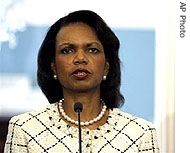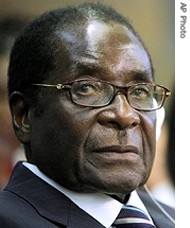-
(单词翻译:双击或拖选)
By David Gollust
State Department
05 June 2008
The United States is expressing outrage1 over an incident Thursday in which Zimbabwean security forces detained U.S. and British diplomats2 trying to visit victims of political violence. Secretary of State Condoleezza Rice calls the situation grave and says the United States will raise the matter in the U.N. Security Council. VOA's David Gollust reports from the State Department.
U.S. officials are calling the latest incident outrageous3 and unacceptable, but they say American diplomats will remain in Zimbabwe despite the harassment4 to support citizens of that country struggling for democracy.
In what was described here as a premeditated act, about 40 Zimbabwean police, intelligence agents and others stopped a convoy5 of U.S. and British diplomats north of the capital, threatening the officials, beating one of their local drivers, and slashing6 vehicle tires.
Five American diplomats and two local staff members were detained. Though they were later released, State Department Spokesman Sean McCormack said the incident - the second of its kind in as many months - will not be forgotten.
He said the United States protested to officials in Harare, will seek out and raise the issue with Zimbabwean President Robert Mugabe's delegation7 at the world food conference in Rome, and will take it up in the U.N. Security Council.
At a joint8 press event with Turkish Foreign Minister Ali Babacan, Secretary of State Rice called the situation in Zimbabwe ahead of a crucial presidential runoff election quite difficult and grave. But she said this is not the time to withdraw the U.S. diplomatic presence in Harare.
 |
| Condoleezza Rice, 05 Jun 2008 |
"We need our diplomats to be able to try and help the international community and the African states assure some modicum9 of civility in those elections, and some modicum of fairness in those elections," said Rice. "And so I think it's important that we maintain a presence there, and that we be able to do our work on behalf of the people of Zimbabwe, who I believe desperately10 want to have a free and fair election runoff."
Tensions have been mounting between the Mugabe government and foreign diplomats, especially those from Britain and the United States who have complained about government moves against the opposition11 in advance of the June 27 election.
Mr. Mugabe is facing opposition leader Morgan Tsvangirai in the run-off. The United States called Mr. Tsvangirai's brief detention12 on Wednesday deeply disturbing.
In London, British Foreign Secretary David Miliband said the kind of intimidation13 seen this week is suffered daily by Zimbabweans, especially those working with the opposition.
He said it underlines the need for the international community, and especially Zimbabwe's neighbors, to monitor the run-off vote:
"The argument today in Zimbabwe is not between Zimbabwe and Britain, it's about two different visions for the future of Zimbabwe," Miliband said. "And it's very important that the international community plays its role by assuring that for the election on June 27th, there are international monitors, properly accredited14 who are able to insure that despite the ravages15 in Zimbabwe at the moment, there is an election that allows the democratic will of the Zimbabwean people to be heard loud and to be heard clear."
 |
| Robert Mugabe attends a high-level conference on World Food Security |
President Mugabe, who has run Zimbabwe since independence, has accused foreign powers and Britain in particular of interfering16 in his country's internal affairs, and conspiring17 with the opposition to restore colonial rule.
Both the United States and European Union have imposed travel and financial sanctions against Mr. Mugabe and his inner circle. The Zimbabwean leader was able to visit Rome this week, skirting the EU travel ban, because he is attending a U.N. function.
 收听单词发音
收听单词发音
1
outrage

|
|
| n.暴行,侮辱,愤怒;vt.凌辱,激怒 | |
参考例句: |
|
|
|
2
diplomats

|
|
| n.外交官( diplomat的名词复数 );有手腕的人,善于交际的人 | |
参考例句: |
|
|
|
3
outrageous

|
|
| adj.无理的,令人不能容忍的 | |
参考例句: |
|
|
|
4
harassment

|
|
| n.骚扰,扰乱,烦恼,烦乱 | |
参考例句: |
|
|
|
5
convoy

|
|
| vt.护送,护卫,护航;n.护送;护送队 | |
参考例句: |
|
|
|
6
slashing

|
|
| adj.尖锐的;苛刻的;鲜明的;乱砍的v.挥砍( slash的现在分词 );鞭打;割破;削减 | |
参考例句: |
|
|
|
7
delegation

|
|
| n.代表团;派遣 | |
参考例句: |
|
|
|
8
joint

|
|
| adj.联合的,共同的;n.关节,接合处;v.连接,贴合 | |
参考例句: |
|
|
|
9
modicum

|
|
| n.少量,一小份 | |
参考例句: |
|
|
|
10
desperately

|
|
| adv.极度渴望地,绝望地,孤注一掷地 | |
参考例句: |
|
|
|
11
opposition

|
|
| n.反对,敌对 | |
参考例句: |
|
|
|
12
detention

|
|
| n.滞留,停留;拘留,扣留;(教育)留下 | |
参考例句: |
|
|
|
13
intimidation

|
|
| n.恐吓,威胁 | |
参考例句: |
|
|
|
14
accredited

|
|
| adj.可接受的;可信任的;公认的;质量合格的v.相信( accredit的过去式和过去分词 );委托;委任;把…归结于 | |
参考例句: |
|
|
|
15
ravages

|
|
| 劫掠后的残迹,破坏的结果,毁坏后的残迹 | |
参考例句: |
|
|
|
16
interfering

|
|
| adj. 妨碍的 动词interfere的现在分词 | |
参考例句: |
|
|
|
17
conspiring

|
|
| 密谋( conspire的现在分词 ); 搞阴谋; (事件等)巧合; 共同导致 | |
参考例句: |
|
|
|















